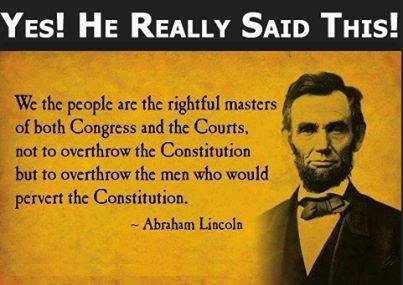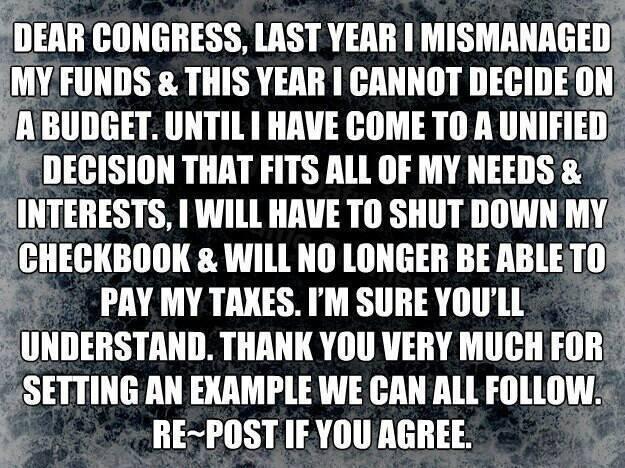[youtube://http://www.youtube.com/watch?v=rfLlF1vtit8 450 300]
Comments »Monthly Archives: October 2013
Human Rights Lawyers’ Advisory: Dick Cheney Must Be Arrested for War Crimes if He Enters Canada
“Lawyers from the National Lawyers Guild (U.S.), International Association of Democratic Lawyers, European Centre for Constitutional and Human Rights (Germany), Brussells Tribunal (Belgium), International Initiative to Prosecute US Genocide in Iraq (Iraq, Egypt, Spain), Lawyers Against the War (Canada) and Rights International Spain (Spain) are urging Canada to either bar Dick Cheney from Canada – as a person credibly accused of torture – or to arrest and prosecute him on arrival, as required by the Convention against Torture. A letter from Lawyers Against the War (LAW) sent to Canada ’s Prime Minister, Attorney General and Ministers of Foreign Affairs and Immigration has been gravely ignored.
“It is long overdue for Cheney and other Bush administration officials to be held to account for the high crimes of instituting and implementing the systematic practice of torture. This record of impunity must not be allowed to stand.” Azadeh Shahshahani, President, National Lawyers Guild.
Torture and war crimes suspect Dick Cheney is scheduled as a keynote speaker at the October 31st luncheon of the Toronto Global Forum, hosted by the International Forum of the Americas . Should Cheney be allowed to freely enter Canada despite the illegalities involved, civil society groups are planning a rally beginning at 11:00 am on Halloween, Oct. 31st, outside the Metro Toronto Convention Centre.
The Facebook page for the protest can be viewed here….”
Comments »While Your Government Was Shutdown Secret Negotiations Continued on the TPP
“OBAMA SECRETLY SIGNING AWAY U.S. SOVEREIGNTY
Shock plan regulates food, medicine, financial markers, Internet freedom
Despite the government shutdown, the Obama administration has continued secret negotiations to complete what is known as the Trans-Pacific Partnership, or TPP.
The expansive plan is a proposed free-trade agreement between the U.S., Australia, Brunei, Chile, Canada, Japan, Malaysia, Mexico, New Zealand, Peru, Singapore and Vietnam.
The agreement would create new guidelines for everything from food safety to fracking, financial markets, medical prices, copyright rules and Internet freedom.
The TPP negotiations have been criticized by politicians and advocacy groups alike for their secrecy. The few aspects of the partnership leaked to the public indicate an expansive agenda with highly limited congressional oversight.
A New York Times opinion piece previously called the deal the “most significant international commercial agreement since the creation of the World Trade Organization in 1995.”
Last week, the White House website released a joint statement with the other proposed TPP signatories affirming “our countries are on track to complete the Trans-Pacific Partnership negotiations.”
“Ministers and negotiators have made significant progress in recent months on all the legal texts and annexes on access to our respective goods, services, investment, financial services, government procurement, and temporary entry markets,” the White House said.
The statement did not divulge details of the partnership other than to suggest a final TPP agreement “must reflect our common vision to establish a comprehensive, next-generation model for addressing both new and traditional trade and investment issues, supporting the creation and retention of jobs and promoting economic development in our countries.”
Secrecy
In February, the Open the Government organization sent a letter to Obama blasting the lack of transparency surrounding the TPP talks, stating the negotiations have been “conducted in unprecedented secrecy.”
“Despite the fact the deal may significantly affect the way we live our lives by limiting our public protections, there has been no public access to even the most fundamental draft agreement texts and other documents,” read the letter.
The missive was signed by advocacy groups such as OpenTheGovernment.org, Project On Government Oversight, ARTICLE 19 and the Global Campaign for Freedom of Expression and Information.
The groups warned issues being secretly negotiated include “patent and copyright, land use, food and product standards, natural resources, professional licensing, government procurement, financial practices, healthcare, energy, telecommunications, and other service sector regulations.”
Lack of oversight….”
Comments »Mark Cuban Shits on the SEC; Perhaps the SEC Should Prosecute Real Criminals
“Oct 16 (Reuters) – Flamboyant billionaire Mark Cuban on Wednesday was cleared by a Texas jury of using a private tip to avoid a big loss on his 2004 sale of Internet company shares, in a stinging rebuke for the U.S. government which had accused him of insider trading.
Cuban, 55, the owner of the Dallas Mavericks basketball team, lashed out at the U.S. government and lead prosecutor Jan Folena after the verdict, saying the government had tried to bully him.
“Jan Folena, who represents the United States of America, stood up there and lied,” an angry Cuban told reporters after the nine-member jury read its decision.
“I’m the luckiest guy in the world and I’m glad I could stand up to them,” he said.
Estimated by Forbes magazine to have a net worth of $2.5 billion, Cuban was accused by the U.S. Securities and Exchange Commission of trading on non-public information when he sold his 600,000 shares in Internet search company Mamma.com – worth $7.9 million – and avoided a $750,000 loss.
The SEC brought the civil lawsuit against Cuban in November 2008. A judge dismissed the suit in 2009 but an appeals court revived the case the following year.
Cuban refused to settle the case and went to trial, even though he said on Wednesday that he had spent more on fees for lawyers than the possible fines for admitting to insider trading. He could have faced up to $2 million in fines, his lawyers said.
“It’s personal. You take all these years of my life, it’s personal,” Cuban said.
SEC lawyers rushed from the court after the verdict without making extensive comments. The agency later issued a short statement saying it was disappointed by the outcome….”
Comments »Teach Your Children Well
[youtube://http://www.youtube.com/watch?v=iFDe5kUUyT0 450 300] [youtube://http://www.youtube.com/watch?v=M_hYdywoV_Q 450 300]
Comments »
Is the Fed Steering the U.S. Towards Default?
[youtube://http://www.youtube.com/watch?v=5bbv-iXytEw#t=78 450 300]
Comments »Your Fearless Government Will Meet Today to Vote on a Deal for the Debt Ceiling and to Reopen Government
The house will meet today at 10am and the senate will meet over lunch. These clowns have one more day to get a deal done or we enter fun times ahead…..
Comments »Twitter to List on NYSE as Per Bloomberg
“Twitter will list its IPO on the New York Stock Exchange, Bloomberg is reporting.
Historically, tech companies and start ups have gone with NASDAQ, but many have speculated that given that exchange’s recent glitches and Facebook’s IPO mishap, Twitter might look elsewhere….”
Comments »Fitch Puts U.S. Credit Rating on Negative Watch
“This just in: credit rating agency Fitch has revised the outlook for the U.S.A.’s AAA credit rating to negative from stable.
The news comes just as the latest talks in Washington, D.C. over how to raise the debt ceiling and end the government shutdown seem to be falling apart.
“The prolonged negotiations over raising the debt ceiling (following the episode in August 2011) risks undermining confidence in the role of the U.S. dollar as the preeminent global reserve currency, by casting doubt over the full faith and credit of the U.S.,” said Fitch in a press release. “This ‘faith’ is a key reason why the U.S. ‘AAA’ rating can tolerate a substantially higher level of public debt than other ‘AAA’ sovereigns.”
Fitch and Moody’s still rate the U.S. AAA, the highest credit rating on the scale.
S&P, the other of the three key rating agencies, stripped America of its AAA rating back in 2011 during the last debt ceiling crisis, citing political instability as the key driver of the downgrade.
Below is the full text of the Fitch release…”
Comments »The Benefits to Joining the EU
“According to initial government estimates, following Croatia’s accession to the EU on July 1, exports fell by 11 per cent, when compared with the same period in the previous year.
The decline for the month of August alone was 19 per cent, writes Poslovni Dnevnik. During the first eight months of this year, exports were down by 6.3 per cent …”
Comments »A 21st Century Shakespearean Tragedy
[youtube://http://www.youtube.com/watch?v=aOL1mJjKngw#t=96 450 300]
Comments »China Calls for a “De-Americanized World”
“The looming prospect of a US default on debt prompted China to call for the world to “de-Americanise”, amid warnings of a new global recession.
In China, Xinhua, the official government news agency, said that as American politicians continued to flounder over a deal to break the impasse, “it is perhaps a good time for the befuddled world to start considering building a de-Americanised world”.
The jibe came as Christine Lagarde, the International Monetary Fund chief, raised the spectre of a repeat of the 2008 financial crash as hopes dwindled for a resolution of the crisis over the debt ceiling and partial government shutdown….”
Sup With All the Shit Canning ?
[youtube://http://www.youtube.com/watch?v=zcn7sw-4dpk#t=98 450 300]
Comments »A Word From Peter Schiff
[youtube://http://www.youtube.com/watch?v=-HA_jZGqFok 450 300]
Comments »Twitter Squeezes The Banks for IPO Debut
“Twitter Inc. is parlaying its surging popularity and the intense competition among banks for Internet deals to squeeze unusually favorable terms from the firms that will take it public.
The fees banks are set to collect for selling the shares—at 3.25% of the money raised, said people familiar with the deal—would be the lowest percentage paid on a U.S.-listed IPO in more than a year, according to Ipreo, a capital-markets data and advisory firm.
What’s more, the microblogging service is nearing completion of a $1 billion credit line from its bankers that it can use to help finance its growth, the people said. The credit is arriving even as Twitter is seen by some analysts as a riskier credit bet than some other Internet companies that went public in recent years.
The arrangement shows the power that high-profile Silicon Valley companies can command on Wall Street. In what has become a standard playbook for these companies, Twitter asked for credit from banks seeking to handle its IPO to lend it money, the people said. That setup enables companies to maximize the money they extract out of Wall Street at the time of their IPOs.
For some banks, agreeing to lend can be a way to establish a relationship with companies going public. When banks work on hot IPOs, they get bragging rights, and position themselves for plum roles in any future transactions the company does.
But the arrangement also means the banks must weigh the costs of providing credit for often-unproven companies against what can be meager IPO fees.
Facebook Inc. FB +0.12% paid an underwriting fee of 1.1% of the money it raised in its IPO last year while Pandora Media Inc. P +0.81% and LinkedIn Corp. LNKD -0.41% each paid 7% in 2011, according to Ipreo. Facebook still paid far more in total dollars because of the size of its IPO—$16 billion—compared with Twitter, which is seeking to raise $1 billion. The average spread for IPOs that have raised between $1 billion and $2 billion in the U.S. since 2001 was 4.6%, according to Ipreo.
Twitter initially tapped Goldman Sachs Group Inc. GS +1.26% to spearhead its IPO, and later added Morgan Stanley MS +1.12% and J.P. Morgan Chase JPM -0.02% & Co. to the circle of banks leading the deal. Bank of America BAC -0.28% Merrill Lynch and Deutsche Bank AG DBK.XE +1.33% also secured roles in the IPO. All of the banks also are providing credit to the company, people familiar with the discussions said….”
Comments »An Open Message to Congress
A Word From Edward Snowden and Julian Assange
[youtube://http://www.youtube.com/watch?v=lesFHt0Cs-U 450 300]
Comments »Will China Force An End to QE?
“Nothing lasts forever… (especially in light of China’s earlier comments)
Submitted by Patrick Barron via The Ludwig von Mises Institute,
We use the term “reserve currency” when referring to the common use of the dollar by other countries when settling their international trade accounts. For example, if Canada buys goods from China, it may pay China in US dollars rather than Canadian dollars, and vice versa. However, the foundation from which the term originated no longer exists, and today the dollar is called a “reserve currency” simply because foreign countries hold it in great quantity to facilitate trade.
The first reserve currency was the British pound sterling. Because the pound was “good as gold,” many countries found it more convenient to hold pounds rather than gold itself during the age of the gold standard. The world’s great trading nations settled their trade in gold, but they might hold pounds rather than gold, with the confidence that the Bank of England would hand over the gold at a fixed exchange rate upon presentment. Toward the end of World War II the US dollar was given this status by international treaty following the Bretton Woods Agreement. The International Monetary Fund (IMF) was formed with the express purpose of monitoring the Federal Reserve’s commitment to Bretton Woods by ensuring that the Fed did not inflate the dollar and stood ready to exchange dollars for gold at $35 per ounce. Thusly, countries had confidence that their dollars held for trading purposes were as “good as gold,” as had been the Pound Sterling at one time.
However, the Fed did not maintain its commitment to the Bretton Woods Agreement and the IMF did not attempt to force it to hold enough gold to honor all its outstanding currency in gold at $35 per ounce. The Fed was called to account in the late 1960s, first by France and then by others, until its gold reserves were so low that it had no choice but to revalue the dollar at some higher exchange rate or abrogate its responsibilities to honor dollars for gold entirely. To it everlasting shame, the US chose the latter and “went off the gold standard” in September 1971.
Nevertheless, the dollar was still held by the great trading nations, because it still performed the useful function of settling international trading accounts. There was no other currency that could match the dollar, despite the fact that it was “delinked” from gold.
There are two characteristics of a currency that make it useful in international trade: one, it is issued by a large trading nation itself, and, two, the currency holds its value vis-à-vis other commodities over time. These two factors create a demand for holding a currency in reserve. Although the dollar was being inflated by the Fed, thusly losing its value vis-à-vis other commodities over time, there was no real competition. The German Deutsche mark held its value better, but German trade was a fraction of US trade, meaning that holders of marks would find less to buy in Germany than holders of dollars would find in the US. So demand for the mark was lower than demand for the dollar. Of course, psychological factors entered the demand for dollars, too, since the US was seen as the military protector of all the Western nations against the communist countries for much of the post-war period.
Today we are seeing the beginnings of a change. The Fed has been inflating the dollar massively, reducing its purchasing power in relation to other commodities, causing …”
Comments »Documentary: The Destruction of America’s Middle Class
[youtube://http://www.youtube.com/watch?v=hTbvoiTJKIs 450 300] [youtube://http://www.youtube.com/watch?v=Bb3gB-qY2bQ 450 300]
Comments »Dollar and Stock Correlation May Spell a Bull Market Top
“The stock market is finally starting to show signs that the bull market may be coming to an end. Before I go into the stock market though, I want to discuss the dollar because I think currencies are going to be integrally tied to the topping process.
For the better part of the past five years a lower dollar has generally been positive for the stock market. However, we are now five years into QE and I think we are at the point where it’s important that the dollar hold its value. At this point I think the stock market is deathly afraid that the dollar is going to crack under five years of continual debasement. As many of you have probably noticed over the last several weeks stocks have been dropping along with the dollar.
We have some interesting currents at play in the currency markets at the moment. It’s been my opinion for some time that the dollar would adjust its yearly cycle low from the spring to later in the fall (this will set up next year’s yearly and three year cycle low to occur late in the year. This is also the most likely time frame generally for the currency crisis to occur). I think that process is now in play.
For this to come to fruition the dollar needs to move below the February low sometime in the next two or three weeks. Keep in mind that other than a three year cycle low the yearly cycle low is the most intense sell off of the year and generally does not terminate until it looks like the world is coming to an end (we definitely haven’t reached that point yet).
I suspect the government shutdown and debt ceiling debacle are going to intensify the dollar’s yearly cycle low this year. This suggests that we are going to see a very aggressive and scary decline in the dollar index over the next 2-3 weeks.
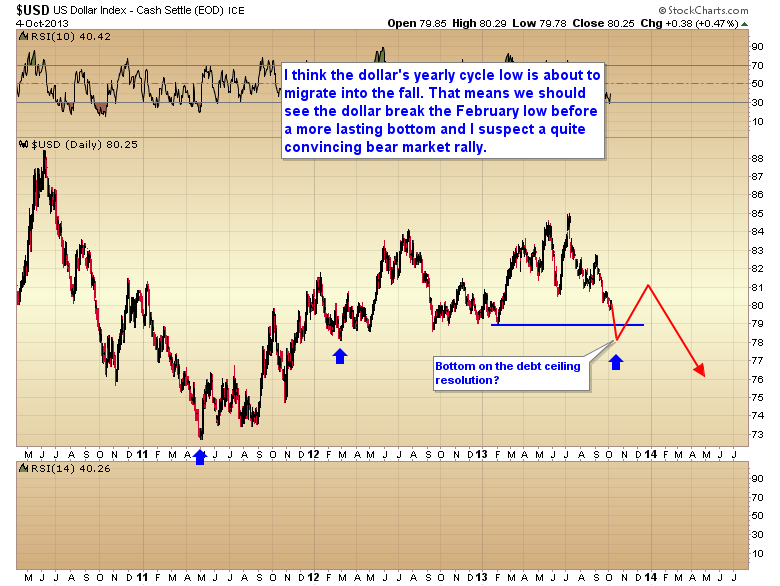
I’m expecting the yearly cycle to bottom either on the debt ceiling resolution, or one day either side of it as the market starts to sniff out a deal. At that point I think we’re probably going to see a significant intermediate degree rally as the currency markets breathe a sigh of relief.
However, within 1-2 months I also expect the currency markets to come to their senses and realize that nothing has changed and the dollar is going to continue to be debased, maybe even at a faster rate than before. At that point I think the dollar will roll over again and get busy moving down into next year’s three year cycle low which should manifest as a moderately severe currency crisis around this same time next fall.
Now let’s look at some of the warning signs in the stock market. To begin with, this is the first time in five years that the advance decline line has failed to follow the market to new highs.
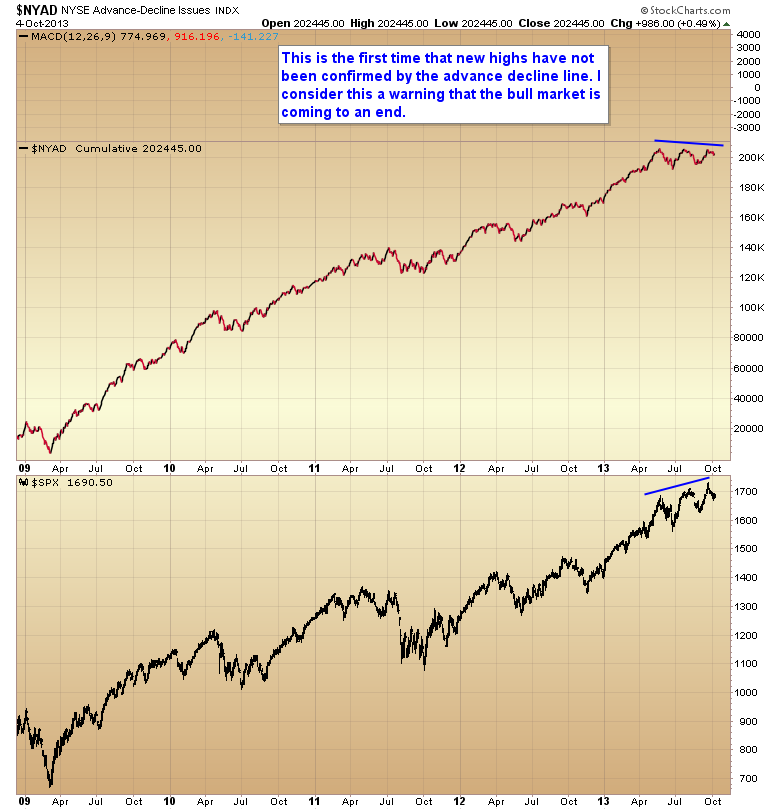
In the next chart I have marked each intermediate cycle low with a blue arrow. You can see that the previous intermediate cycle ran quite long as it was stretched by QE 4 to 33 weeks. This is a full 11 weeks longer than a normal intermediate cycle duration. Often a long cycle like this is followed by a short cycle. Note that the last intermediate cycle had 4 complete daily cycles nested within it. I think there is a very good chance that the current intermediate cycle will only have two.
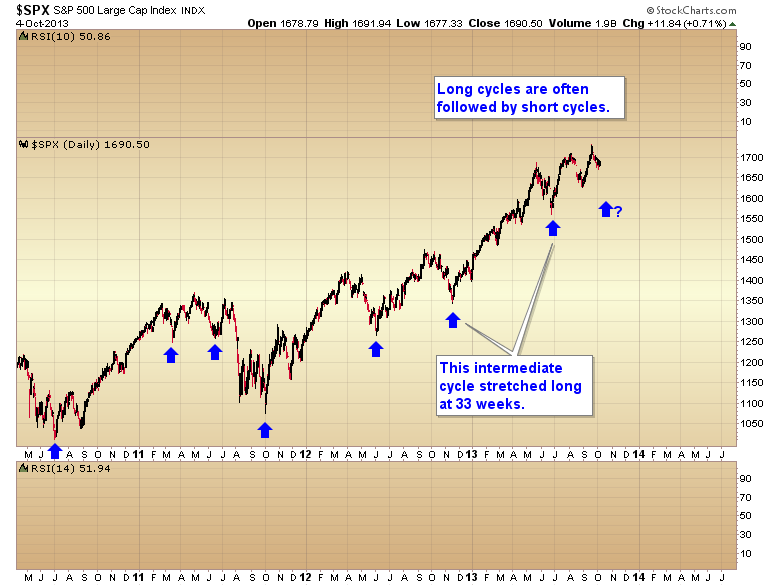
Considering that the current daily cycle is already on day 25 …”
Comments »
